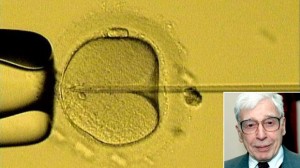I have to admit that I have mixed reactions when reading about 85 years old professor Robert Edwards at the University of Cambridge receiving the Nobel Prize in medicine.
He began work on in vitro fertilization, or IVF in the late 70s, and as the Nobel committee says, he was “persistent and unperturbed in fulfilling his scientific vision,” and today, the odds of a couple having a baby after a single cycle of IVF treatment are about 1 in 5, roughly the same odds as a fertile couple trying to have children naturally…For millions of families, it created the possibility of a truly joyful and extraordinary event.”
I understand that successful IVF is huge for those who desperately want their own biological child. At the same time, this achievement has helped …
..bring 4 million more babies and counting into the world.
It has also brought ethical issues that have not been resolved. According to Lori B. Andrews of the Chicago-Kent College of Law today, “a child can have up to five parents: the sperm donor, the egg donor, a surrogate mother who brings the child to term in her womb, and the couple intending to raise the child. Some laws say the legal mother is the woman who gives birth, but nowadays we can no longer depend on biology to determine the mother.” And for surrogate mothers, many experts see ethical issues any time human reproduction is mixed with cash payments.
Then there is the point about whether there should there be an age limit on women using IVF. Remember the Spanish woman in her 60s who made headlines when she gave birth after using IVF, and had twins? It caused an uproar, and it got even louder when she died two years later.
In the grand scheme, giving this kind of award also continues to reinforce child-centrism. It reinforces the message that in our society it’s all about the almighty baby, and biological ones at that.
I’d like to see international awards for those who find homes for all the children already here. To encourage stronger values on adoption over biology. But that is coming from someone who never felt the biological clock…
Ah the bio clock! I can’t find any solid evidence that it actually scientifically exists…the person who proves it does or does not would be a fine Nobel winner indeed.
What do you think of the nobel prize in medicine going to Robert Edwards?


I could not agree with you more! I would like to see this prize go to someone who has actually given people another option when there was no option. There are millions of people suffering from debilitating diseases, and they don’t have any choice but to suffer gracefully. I don’t necessarily begrudge the folks that use IVF to make a dream a reality,I want to make that clear. I don’t have any children although I do hope my biological clock starts ticking sometime before the batteries die. I just believe that God gives some people unique opportunities, and by using a medical procedure to give us what nature did not, we are perhaps missing the ultimate opportunity to change the life of a child. A child without too many options. Kids are a lot like animals. Why spend hundreds or thousands of dollars to buy a tailor-made breed when there are so many wonderful ones that need adopting? No, they may not have the exact color eyes you always expected, but I can guarantee they will love you the same. (If not more!)
I can only say: I totally agree with everything you said!
About IVF, I don’t really have a problem with it in general – just as I’ve used medical technology (an IUD)to stop myself from having children I don’t want, other women may use it to have children they do want. And I wonder just how much the crop of IVF babies have really contributed to the population as a whole.
Nonetheless, I’m a little conflicted on women over a certain age (let’s say 50) using these technologies. I’m not saying it should be legally prohibited to them. But in my view, since egg donation doesn’t give you a genetically related child (for those to whom genetics is important), what advantage does it really have over adoption? In my case, being a 42-year-old woman in the throes of perimenopause, I’m pretty sure that if I try to expand my family, I’ll look to adoption, not medical technology.
I think the world could get along just fine without IVF. I really don’t get the drive that people have to biological children. (How many of these IVF children grow up to become infertile themselves? Perhaps there was a reason that these parents can’t conceive naturally?) It’s too bad that people turn their noses up at adoption.